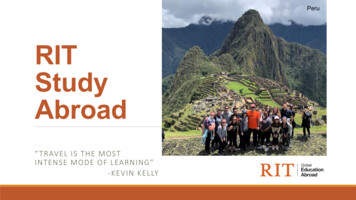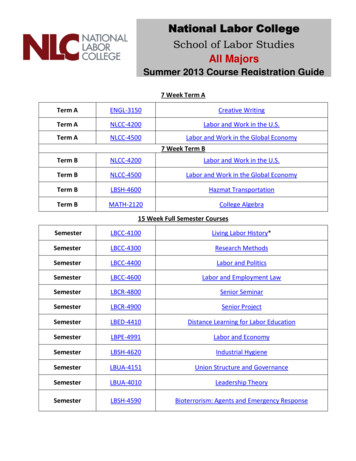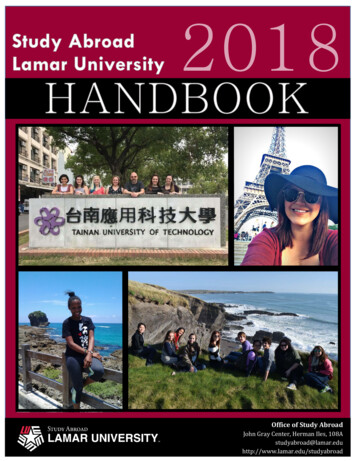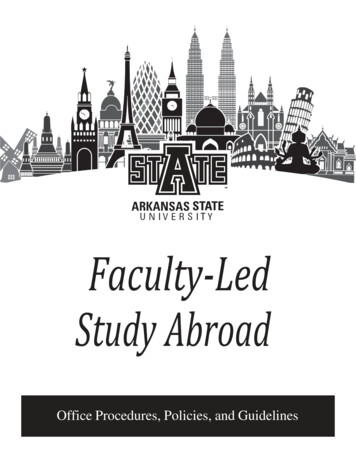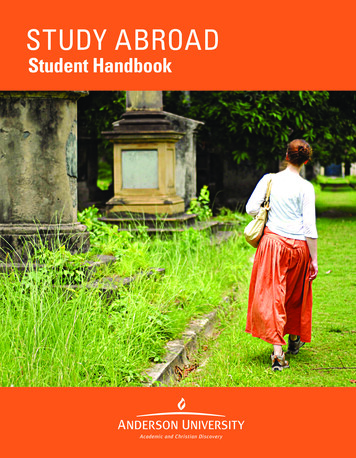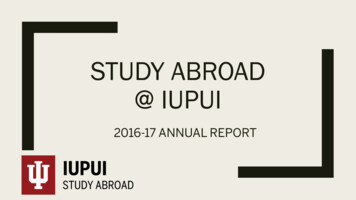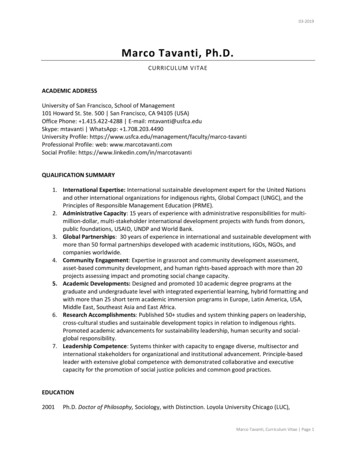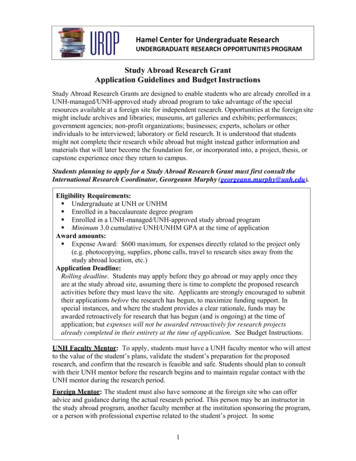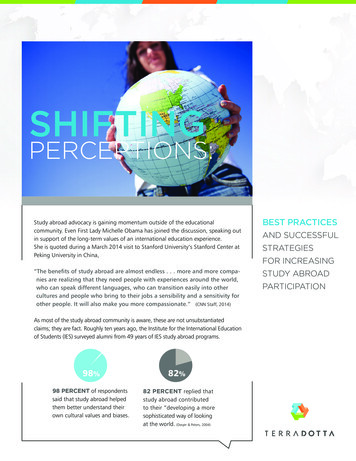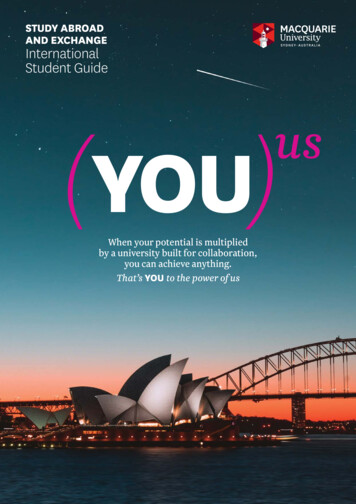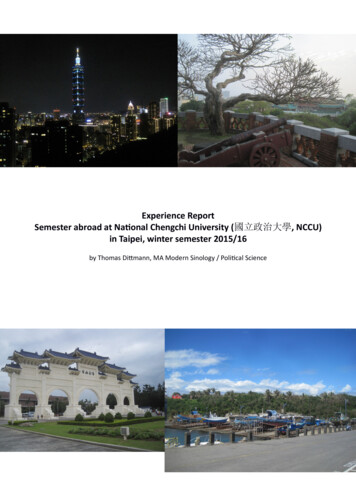
Transcription
Experience ReportSemester abroad at National Chengchi University (國立政治大學, NCCU)in Taipei, winter semester 2015/16by Thomas Dittmann, MA Modern Sinology / Political Science0
This report is meant to give students considering to do an exchange semester at NCCU an insightinto my personal experiences, as well as to provide students who have already decided to go toTaipei with some helpful information before their exchange.Preparing the semester abroadWhen I started my master's program in Goettingen, I had already spent a considerable amount oftime in mainland China. However, I had neither been to Taiwan before nor been a regular studentat a Chinese university. Since NCCU is a university specializing in social sciences, I planned to do anexchange semester there, doing courses for my minor political science.As you may know, it is mandatory to do a semester abroad in our bachelor's program, but not inthe master's program. I want to express my special thanks to our department head professorSchneider, whose support made my exchange possible.At the Goettingen Faculty of Social Sciences, recognition of courses done abroad is no problem atall, provided the student consults with the department in charge beforehand and gets a learningagreement validated. The process for my own exchange went as follows: At first, I selected all thecourses offered during my semester at NCCU that were of interest for me and printed out thecourse descriptions. Then, I went to the advisor in charge at the Institute for Political Science whothen evaluated the descriptions and decided which courses would be recognized for whichmodules in Goettingen. Among these, I then chose the courses I subsequently took at NCCU. Oneimportant thing to keep in mind with regard to the recognition is that one credit at NCCUcorresponds to two ECTS. This is as well to be discussed and agreed upon with the respectivedepartment in Goettingen.NCCU CampusView from the balcony of our dorm, Taipei 101 in the backgroundThe campus and its location withinTaipeiNCCU is located in Wenshan districtin the southeast of the city. Thus, itis quite remote from downtownTaipei. However, due to Taipei's welldeveloped public transport system,particularly the metro (or MRT),most parts of the city are stillrelatively accessible.The campus is spread across a hilland the foot of this hill. Most, butnot all, teaching and administrationbuildings are situated downhill,dormitories uphill and downhill. It is a 15 to 20 minutes walk from the uphill dorms to the twocampus gates, but there are also small buses running up and down the hill.Numerous sports facilities are available at low cost or free of charge in and around campus,including fields and courts for several kinds of ball sports, a long course swimming pool and1
exercise rooms. The banks of the small river right next to campus were turned into a park verysuitable for running or cycling, but also for barbecues.The uphill campus is covered in greenery, one frequently encounters hikers passing through. Thehills surrounding NCCU are great for hikes, there are several temples around the area, mostnotably Zhinan Temple (指南宮).View from Zhinan Temple, the campus is visible on the far right in the centerof the photoHousingThe master student dorm I lived induring my stay at NCCU is uphill.The dorm is a modern buildingwith convenient facilities such asfridges, water dispensers andwashing machines. Rooms arebasic but in good condition,functional and clean. Masterstudents live in single or doublerooms, bachelor student dormshave four students per room as faras I know. Since I lived in a dorm, Icannot say too much about offcampus housing. However, itseems to be quite complicated toarrange for a room or apartmentto rent before arrival in Taipei. Many offers available online at English-language websites are aimedat so-called expats and therefore in higher price segments.In and around the dorms, it is expectedly easy to meet other people, especially other exchangestudents. We had a lot of European exchange students living on our floor, but also exchangestudents from elsewhere in Asia as well as regular students, mostly from Taiwan and China.Although one should be careful not to overgeneralize these kinds of things, most Taiwanese peopleare very polite and quite reserved. Therefore, it can be difficult to meet people beyond the circle ofexchange students. Nevertheless, anyone who approaches people friendly and open-mindedly willnot have trouble making friends, just like anywhere else.Assistance for studentsThe team of the Office of International Cooperation (OIC) around Deborah Lee is very helpful andsupportive. They assist foreign students with any problems or questions during their stay.Furthermore, NCCU runs a buddy program, i. e. all exchange students have a regular NCCU studenthelping them during their first weeks. My buddy and me were already in touch via e-mail longbefore I arrived in Taipei and he was very helpful and kind.Getting aroundIt is highly recommendable to get an Easycard (you1you2ka3 悠遊卡) as soon as possible uponarrival. This card is not only the most convenient method to pay for public transport, it can be usedto pay for cabs and in many stores like the ubiquitous 7-Elevens, too. The card is also the methodof payment for the U-Bikes, a system of rental bicycles available at a large number of rental2
stations all across Taipei.If your destination is around the eastern part of the city centre, going to downtown Taipei by thebuses running through Wenshan tunnel (文山隧道) is much quicker than taking the metro.Depending on your destination, it can also be advantageous to take a bus first and transfer to themetro at Gongguan (公館) or Wanfang Hospital (萬芳醫院) stations, instead of taking the metro atthe zoo, the metro station closest to NCCU. Wanfang Hospital it also the place all exchangestudents have to go to in order to get their medical exams at the beginning of the semester.If you are in a hurry or it is too late at night to get a bus or the MRT, cabs are basically availableanywhere and at any time. Cab fares are very reasonable, especially if you can share a cab withseveral people.Studying at NCCUI only took courses offered by the Department of Political Science and the Department ofDiplomacy taught in Chinese. Thus, I do not know a lot about the English-taught courses offered bythe OIC or about the Chinese language classes. At the beginning of the semester, I still consideredtaking OIC courses too, so I caught a glimpse of some of them. The courses seemed interesting andthe professors very capable, but some courses were overcrowded. As far as I can tell from thecourse catalog, the selection of courses was good in other branches of the social sciences apartfrom political science as well.Coursework at NCCU differed significantly from what I was used to in Germany. In general,professors' lectures made up a larger share of time in seminars than here, mostly followed bydiscussion and debate among students. All of the professors spoke loudly, clearly and not too fastso I could understand them quite well. I had bigger difficulties understanding my classmatessometimes. Anyway, I believe that everyone with an advanced level of Chinese, say HSK 5 or even4, or who does not have huge difficulties in the course Modern Chinese VI at our department, cantake away much from academic courses taught in Chinese. Depending on one's Chinese level, thecourses can either be treated as more 'actual content-related courses' or more 'language classes ina realistic setting'. In fact, this also varies within one single course. For instance, when I was alreadyfamiliar with the topic of the day, I was able to participate in class much more actively than was thecase with topics I had never learned about before. In any case, one definitely learns a lot.One big difference is that in the political science courses, students were required to write literaturesummaries either every single week or at least for a significant number of sessions. AlthoughChinese was the course language, I was kindly allowed to write these summaries either in Chineseor in English. The literature was mostly in English. Additionally, instead of just 90 minutes, seminarsessions there lasted two or three hours with a short brake. Of course, the three hour sessions inparticular could be very tiring at times. Nevertheless everything worked out ok and I am glad I wasable to take the classes and make this experience.Now you might think that the required workload is just excessive. To put this into perspective, theworkload requirements for the final assignments were by far not as high as in Goettingen, so that Iconsider the overall workload to be comparable and the credit conversion to be fair.NCCU's library is very well equipped, at least in the area of political science with East Asia focus.Thus, it is also possible to conduct research for projects in Goettingen during the stay there. In fact,I even accessed the library again with the help of a NCCU student after I returned to Germany3
when I needed a work for a paper that was not available at our library, but at NCCU.As a last note for this section, I would advise students not to overload their schedule during theexchange semester. There are many things to discover in Taipei and in Taiwan as a whole. If you arethere for the first time, it would be a shame to sit in class or work on assignments all the time andto miss out on those.The city Taipei and beyond, conclusionIn my opinion, Taipei is a fascinating place with a high quality of life. It offers the advantages of ametropolis, like a rich cultural life, for instance concerts of important bands in musical genres faroff the mainstream. At the same time, some of the problems rampant elsewhere are less prevalentthere, for example regarding the situation of the environment or traffic.The city is located in a basin, surrounded by green hills that make for an intriguing scenery incontrast with the city's mass of buildings. One is able to escape city life any time.Not far southeast of the 101 there is Elephant Mountain (象山) where many photographers try totake the perfect shot of the city's highest building. Yangmingshan (陽明山) National Park to thenorth is also not far away from Taipei. In general I felt like Taipei is a relatively green city, with manypeople taking care of plants in the small front yards of their residential buildings.Unsurprisingly, Taipei's culinary landscape offers a wide range of tastes. Nothing is left to bedesired, from all Chinese regional cuisines, over truly good Western food, to Indian restaurantsrecommended by fellow exchange students from the subcontinent.Another place worth mentioning is the area around National Taiwan University (臺灣大學) andGongguan metro station. Located not too far from NCCU, around there one can find loads of coffeeshops, restaurants, little shops, art on display and so on, many of these catering to a studentaudience in particular. One can spend one or the other nice afternoon just strolling, (window)shopping or having a cup of coffee.Fort Provintia, TainanThe Pacific on the southeastern coast4
You can obviously rely on any decent travel guide for sights and activities, I just want to mention afew of my personal highlights here: In Taipei, the palace museum (故宮博物館) is definitely wortha visit. It is huge, so if you take your time with it you might very well have to go there twice to seeeverything. I also highly recommend the public hot springs in Xinbeitou (新北投). Were they not sofar away all across the city, I might have gone there every week to take a relaxing bath. Outside ofTaipei, I heartily recommend the area around Taroko (太魯閣) Gorge. Kenting (墾丁) National Parkwas really great and quiet in winter, though it seemed like it might be totally overcrowded in themain tourist season. Tainan with the remains of Dutch colonialism is also a great experience. Thislist could go on and on, as I already mentioned there are countless things to discover in Taiwan.All in all, my time in Taiwan was a great experience and I am determined to return there in thenear future. In my opinion, doing an exchange at NCCU is highly recommendable for any student ofthe social sciences with an interest in East Asia, and of course especially for students at theDepartment of East Asian Studies. Should you have any questions regarding my stay, please feelfree to contact me at: thomas.dittmann@stud.uni-goettingen.de5
modules in Goettingen. Among these, I then chose the courses I subsequently took at NCCU. One important thing to keep in mind with regard to the recognition is that one credit at NCCU corresponds to two ECTS. This is as well to be discussed and agreed upon with the respective department in Goettingen. NCCU Campus The campus and its location within

